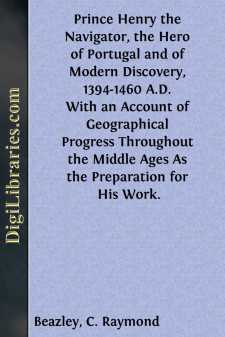Categories
- Antiques & Collectibles 13
- Architecture 36
- Art 48
- Bibles 22
- Biography & Autobiography 813
- Body, Mind & Spirit 142
- Business & Economics 28
- Children's Books 15
- Children's Fiction 12
- Computers 4
- Cooking 94
- Crafts & Hobbies 4
- Drama 346
- Education 46
- Family & Relationships 57
- Fiction 11828
- Games 19
- Gardening 17
- Health & Fitness 34
- History 1377
- House & Home 1
- Humor 147
- Juvenile Fiction 1873
- Juvenile Nonfiction 202
- Language Arts & Disciplines 88
- Law 16
- Literary Collections 686
- Literary Criticism 179
- Mathematics 13
- Medical 41
- Music 40
- Nature 179
- Non-Classifiable 1768
- Performing Arts 7
- Periodicals 1453
- Philosophy 64
- Photography 2
- Poetry 896
- Political Science 203
- Psychology 42
- Reference 154
- Religion 513
- Science 126
- Self-Help 84
- Social Science 81
- Sports & Recreation 34
- Study Aids 3
- Technology & Engineering 59
- Transportation 23
- Travel 463
- True Crime 29
Prince Henry the Navigator, the Hero of Portugal and of Modern Discovery, 1394-1460 A.D. With an Account of Geographical Progress Throughout the Middle Ages As the Preparation for His Work.
Categories:
Description:
Excerpt
INTRODUCTION.
THE GREEK AND ARABIC IDEAS OF THE WORLD, AS THE CHIEF INHERITANCE OF THE CHRISTIAN MIDDLE AGES IN GEOGRAPHICAL KNOWLEDGE.
rabic science constitutes one of the main links between the older learned world of the Greeks and Latins and the Europe of Henry the Navigator and of the Renaissance. In geography it adopted in the main the results of Ptolemy and Strabo; and many of the Moslem travellers and writers gained some additional hints from Indian, Persian, and Chinese knowledge; but, however much of fact they added to Greek cartography, they did not venture to correct its postulates.
And what were these postulates? In part, they were the assumptions of modern draughtsmen, but in some important details they differed. And first, as to agreement. Three continents, Europe, Asia, and Africa, an encircling ocean, the Mediterranean, the Black Sea and Caspian, the Red Sea and Persian Gulf, the South Asiatic, and North and West European coasts were indicated with more or less precision in the science of the Antonines and even of Hannibal's age. Similarly, the Nile and Danube, Euphrates and Tigris, Indus and Ganges, Jaxartes and Oxus, Rhine and Ebro, Don and Volga, with the chief mountain ranges of Europe and Western Asia, find themselves pretty much in their right places in Strabo's description, and are still better placed in the great chart of Ptolemy. The countries and nations from China to Spain are arranged in the order of modern knowledge. But the differences were fundamental also. Never was there a clearer outrunning of knowledge by theory, science by conjecture, than in Ptolemy's scheme of the world (c. a.d. 130). His chief predecessors, Eratosthenes and Strabo, had left much blank space in their charts, and had made many mistakes in detail, but they had caught the main features of the Old World with fair accuracy. Ptolemy, in trying to fill up what he did not know from his inner consciousness, evolved a parody of those features. His map, from its intricate falsehood, backed as it was by the greatest name in geographical science, paralysed all real enlargement of knowledge till men began to question, not only his facts, but his theories. And as all modern science, in fact, followed the progress of world-knowledge, or "geography," we may see how important it was for this revolution to take place, for Ptolemy to be dethroned.
THE WORLD ACCORDING TO PTOLEMY.
The Arabs, commanding most of the centres of ancient learning (Ptolemy's own Alexandria above all), riveted the pseudo-science of their predecessors on the learned world, along with the genuine knowledge which they handed down from the Greeks. In many details they corrected and amplified the Greek results. But most of their geographical theories were mere reproductions of Ptolemy's, and to his mistakes they added wilder though less important confusions or inventions of their own. The result of all this, by the tenth century a.d., was a geography, based not on knowledge, but on ideas of symmetry. It was a scheme fit for the Arabian Nights.
And how did Ptolemy lend himself to this?
His chief mistakes were only two;—but they were mistakes from which at any rate Strabo and most of the Greek geographers are free. He made the Indian Ocean an inland sea, and he filled up the Southern Hemisphere with Africa, or the unknown Antarctic land in which he extended Africa. The Dark Continent, in his map, ran out on the one side to the south-east of China, and on the other to the indefinite west, though there was here no hint of America or an Atlantic continent. It was a triumph of learned imagination over humdrum research....


